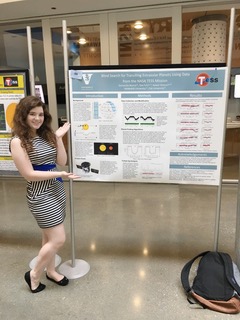Immersion and Study Abroad
Immersion is… an opportunity for undergraduate students to pursue their passions and interests through experiential learning. The majority of physics students do research as an Immersion experience. Students may get started in research by contacting a professor on their own or by asking for guidance from the Director of Undergraduate Studies or any other faculty member. Normally, students wait to start research until they have completed at least one year of physics and mathematics coursework; some computer science (programming) skills are also often invaluable in getting started in research.
There are two ways to satisfy the immersion requirement in the Department of Physics and Astronomy:
1. Honors track:
The Honors Program requires a high level of accomplishment in a rigorous program of coursework and culminates in research work which is presented as an Honors thesis. Note particularly the requirements of research or thesis credit hours and the grade point average for a) all coursework, b) coursework in the major, and c) coursework taken while a candidate for honors. In order to allow completion of the thesis defense before the spring semester of the senior year, application to the Honors program during the junior year is strongly encouraged. This will allow you, for example, to complete Honors work before application to graduate schools.
2. Research project based on courses and research in Physics or Astronomy:
- Complete 5 credit hours of undergraduate research PHYS 3850 and/or ASTR 3850
- Complete a physics or astronomy course that provides suitable training for the chosen research direction (3 credits). The course should be pre-approved by the Director of Undergraduate Studies for Physics and Astronomy
- Capstone seminar (PHYS 3600, 1 credit)
- Write a 10-15 page journal-style research paper
The Immersion experience can also be greatly enhanced by a semester of international study. We strongly encourage physics majors who desire an international experience to study abroad, and about one-fourth of them do so. Though a study abroad experience is not required, we encourage physics majors to study abroad in English-speaking countries (England, Scotland, Ireland, New Zealand, Australia, and South Africa), where they can take physics and astrophysics courses while abroad. Various study abroad programs are offered during the fall or spring semester. For general information, visit the Global Education Office.
Student Stories
Samantha Bianco ’22

Bianco, the first Vanderbilt student to officially complete an Immersion project, was named co-author on a graduate-level scientific research paper. Working in Professor of Astronomy, Keivan Stassun’s lab, her Immersion project inspired her plans for the future, and she became interested in a career focused on the communication of science, specifically space science within an organization like NASA.
“I really love the idea of taking something that’s really complex with tons of scientific jargon and putting it into words that the general public can understand and be interested in,” she said.
Read more about Sam’s experience.
